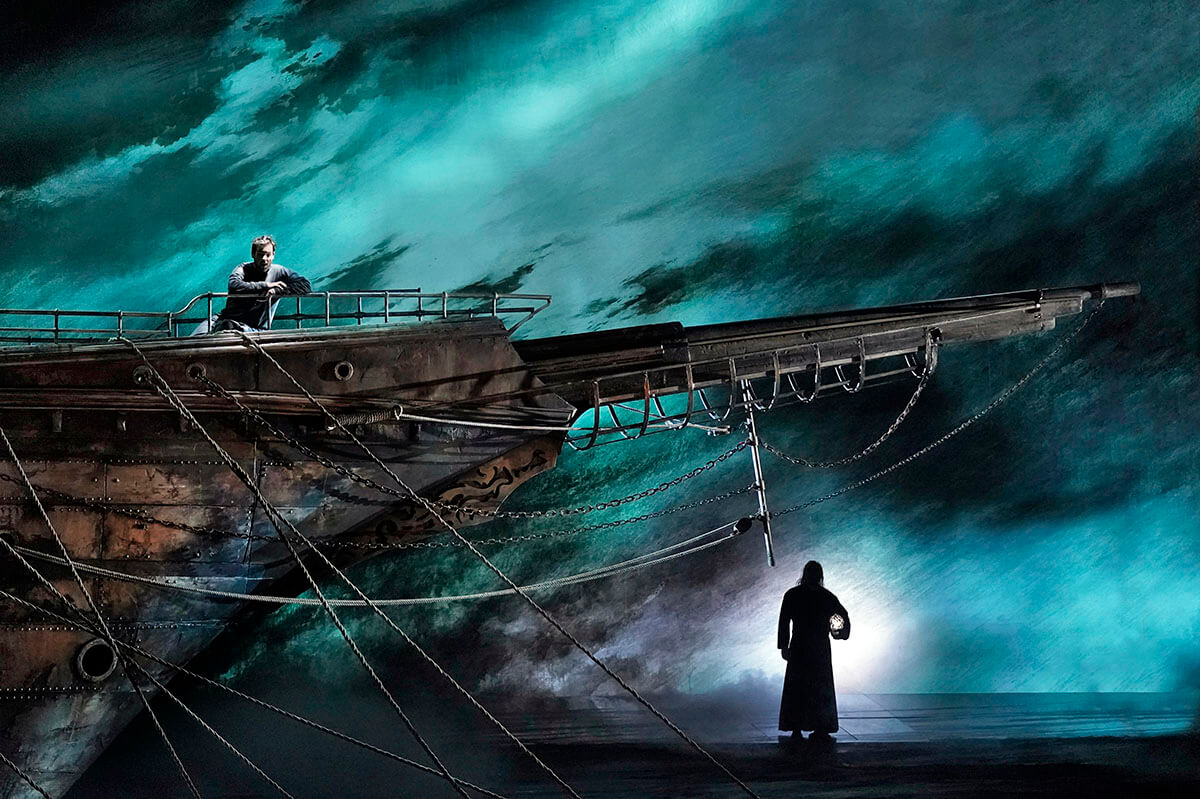VIEWPOINTS – For its new productions of Handel’s AGRIPPINA & Wagner’s DER FLIEGENDE HOLLÄNDER, the Met turns to a pair of tried-and-true directors
- By drediman
- March 3, 2020
- No Comments
Over the last few weeks, the Metropolitan Opera unveiled two new productions. I’m happy to report that both are noteworthy and thought-provoking efforts, the result of two brilliant directors tastefully retreading past triumphs. If the new productions aren’t quite the revelations that those previous stagings were, they’re nonetheless welcome additions to the Met’s evolving portfolio of productions.

Sir David McVicar’s new production of Handel’s “Agrippina” at the Metropolitan Opera House.
First up was Sir David McVicar’s new production of Handel’s Agrippina (RECOMMENDED), which premiered at New York’s mighty opera company just about a month ago (there are only two performances left in the maiden run). The production was originally seen at the Théâtre Royal de la Monnaie / De Munt in Brussels and has been “adapted” by the Metropolitan Opera for its larger stage. Mr. McVicar — one of the Met’s most successful and prolific go-to directors — has updated the opera’s ancient Roman setting to reflect the corrupt, deal-making world of contemporary politics to deliciously comic (if unsettling) effect. Indeed, it’s the same kind of aggressively-paced but playful approach the Scottish director took with his landmark 2005 production of another Handel opera, Giulio Cesare. Both productions are also marked by their considerable attention to detail, particularly with regards to their finely-tuned characterizations. In the duplicitous title role, mezzo-soprano superstar Joyce DiDonato sounded lustrous and was as compelling an actress as ever. But really, pretty much the entirety of the originating cast was smashing – from the scene-stealing mezzo-soprano Kate Lindsey as Agrippina’s brash, strutting son; to soprano Brenda Rae’s layered performance as the “it” girl Poppea; to countertenor Iestyn Davies’ luxuriously-voiced Ottone. Each gave fully-formed seriocomic performances that never sacrificed musical integrity for crowd-pleasing shenanigans. In a rare feat, conductor Harry Bicket elicited buoyant, propulsive playing from the Met Orchestra, impressively managing to captivate the huge opera house via a relatively intimate Handel score.

François Girard’s new production of Wagner’s “Der Fliegende Holländer” at the Metropolitan Opera House.
Last night marked the gala opening of French Canadian director François Girard’s highly anticipated new production of Wagner’s early masterpiece Der Fliegende Holländer (RECOMMENDED). The painterly staging is a co-production between the Metropolitan Opera, Dutch National Opera, the Abu Dhabi Festival, and Opéra de Québec (where it originally premiered). In my mind, Mr. Girard’s 2013 staging of the same composer’s Parsifal is one of the crown jewels in the Met’s repertoire. His “Flying Dutchman” takes a similarly symbolist approach, interpreting the mythic ghost story as Senta’s psychological fever dream. This less literal interpretation works well enough, although the more stylized approach at times camouflages the opera’s underlying narrative. Unlike Parsifal, which is in essence a ritualistic experience, Der Fliegende Holländer is more reliant on conventional storytelling to achieve its intended dramatic effect. Nevertheless, there are segments that are intriguingly staged, notably the visually dynamic representations of the turbulent Prelude and the typically static spinning chorus. Whenever the plotting takes center stage, however, Mr. Girard’s vision unfortunately becomes muddled (like during the opera’s eventful climax). On opening night, Valery Gergiev’s conducting was valiant if unfocused, achieving only occasional bursts of inspired music-making (I’m still thinking of maestro Yannick Nézet-Séguin’s transcendent reading of the score a few years ago). Replacing an ailing Bryn Terfel, bass-baritone Evgeny Nikitin was solid as the Dutchman, if lacking some of the stage presence and vocal heft of the Welsh opera star. German soprano Anja Kampe is finally making her Met debut as Senta, and she was sensational, ably handling the daunting vocal requirements of the role. Rounding out the cast are Bass Franz-Josef Selig as Senta’s father and tenor Sergey Skorokhodov as her axed ex-boyfriend. Both were excellent, as was the tremendous work of the Met Chorus.
AGRIPPINA
Opera
The Metropolitan Opera
3 hours, 30 minutes (with one intermission)
Through March 7
DER FLIEGENDE HOLLÄNDER
Opera
The Metropolitan Opera
2 hours, 30 minutes (without an intermission)
Through March 27

 Copyright © 2025
Copyright © 2025
Leave a Reply